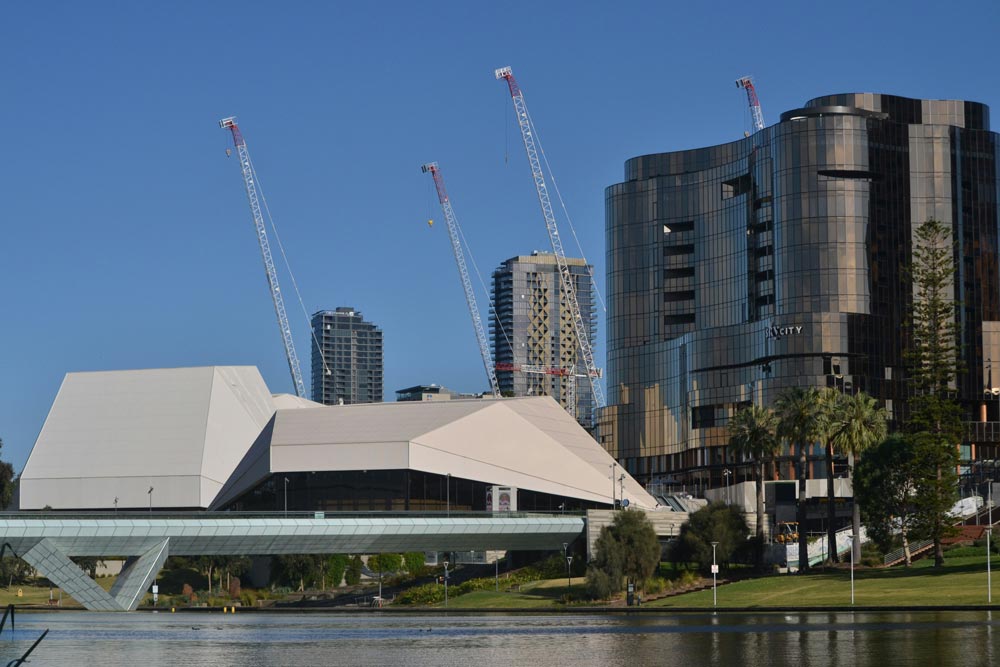South Australia’s construction sector is far more than bricks and mortar – it’s central to economic growth, jobs and infrastructure delivery. However, construction is consistently one of the most dangerous industries to work in. A danger that can be magnified by workers who misuse drugs and alcohol, and construction firms who don’t adequately manage misuse in their workplace.
Construction is big in South Australia
Underscoring the importance of construction is the fact that 87,000 South Australians (about 9 % of all workers) work in construction – a rise of 16,300 since 2020. Recent ABS and Master Builders data shows the state led the nation in growth in construction work in the March 2025 quarter, reaching $4.59 billion in total work completed – a 7.7 % year‑on‑year increase. This is comfortably ahead of the national average of 3.5 %.
Given its scale, growth trajectory, and major projects (including the North–South Corridor, Fleurieu upgrades, desalination plant works, and tram separation projects), the construction industry is often considered the engine room of South Australia’s current expansion.
But with growth comes risk
Construction is also consistently one of the most dangerous industries in Australia, and South Australia is no exception. Nationally, construction accounts for around 16 % of all worker fatalities and a large share of serious injury claims.
Looking at one category of risks alone – falls – paints a sad picture. SafeWork SA’s 2023 Health & Safety Snapshot revealed 105 serious fall‑related injuries in 2023. Over half occurred in construction, five times more than any other sector. That’s 58 serious fall injuries, including 36 in residential work and 10 involving apprentices. Falls from height remains the second‑highest cause of workplace fatalities nationwide, with 29 deaths Australia‑wide in 2023, up from 17 the year before.
This is only looking at falls in construction. 375 electric shock injuries were reported across the state in a recent one-year period, with at least half involving construction workers.
Yes, construction is big, but so too can be the risk.
Why drug and alcohol management matters
In such a high‑hazard environment, even small lapses in attention or judgment can be catastrophic. This is why proactive drug and alcohol management—and rigorous testing—is not optional, it’s critical to safety culture in construction.
Construction work can involve shift work, long hours, physical fatigue, isolation, and high psychological stress. These conditions can elevate the risk of both alcohol misuse and illicit or prescription drug use, particularly when workers deal with chronic pain or stress. That’s why construction is widely viewed as a “risk industry” for substance use.
While employers cannot—and should not—control what someone does in their own time, they have a legal and moral duty to ensure that any worker who comes to site is fit for duty and unimpaired, and able do their safely.
The role of drug and alcohol testing
Drug and alcohol testing plays a pivotal role in protecting workers, subcontractors, visitors, and the wider public. Here’s how:
- Preventing impairment-related incidents: Even moderate alcohol levels or recent drug usage can slow reaction time, impair balance or decision‑making—especially critical where heavy machinery, cranes, or working at height are present.
- Reinforcing safety culture: Regular, transparent testing signals that safety isn’t negotiable. It deters substance use before work hours.
- Supporting early intervention: Testing programs should be conducted alongside education, access to counselling, or referral pathways for employees who may be struggling.
- Meeting regulatory obligations: Owners and managers under WHS laws must manage hazards and ensure all workers are safe and capable. Drug and alcohol policies form part of that compliance framework.
Integrity Sampling South Australia: Your partner in safety
If you own or manage a construction business in South Australia, Integrity Sampling is here to help. We offer:
- Drug and alcohol testing programs tailored to your needs
- 24/7 emergency call-out ensuring a fast, on-site response
- Chain‑of‑custody management, ensuring testing is robust, legally defensible, and confidential
- Policy development support
- Education sessions
Construction matters to South Australia
The construction industry in South Australia underpins state growth—but it comes with serious safety risks. With climbs in serious injuries from falls, electrical hazards, and other risks, the consequences of impairment on site can be disastrous.
A robust drug and alcohol management program—with support from Integrity Sampling—protects businesses, workers, their families, and the community. By combining testing, education, policy, and on‑site support, construction employers can uphold safety while supporting workforce wellbeing.
At the end of the day: construction sites should be places of progress—not tragedy. Ensuring workers are unimpaired is one of the most effective—and ethical—steps companies can take to honour that goal.
FEATURED IMAGE CAPTION:
Discover why drug and alcohol management is critical in South Australia’s booming construction industry. Learn how testing can reduce risks and improve safety on site. Credit Michael Obeysekera https://unsplash.com/photos/white-and-gray-building-near-body-of-water-during-daytime-yh4eadAtOeo






